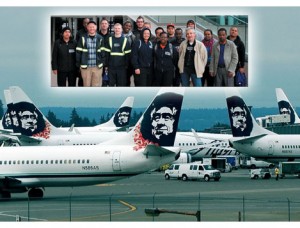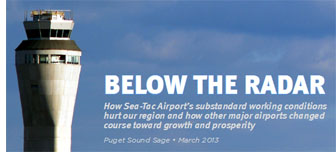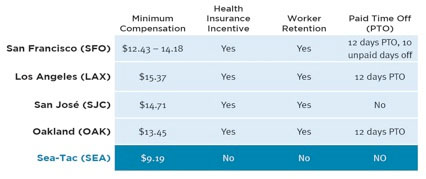ELECTION
Alaska Airlines fighting to keep wages low
By DAVID GROVES
The Stand
OLYMPIA (Oct. 29, 2013) — Deep-pocketed corporate interests are now filing their Public Disclosure Commission reports indicating how much last-minute money they are pumping into initiative campaigns, and the numbers are truly alarming. In the case of labor-supported measure to label genetically engineered foods, The Seattle Times reports today:
Bankrolled by out-of-state biochemical giants and food-industry heavyweights, the campaign to defeat food-labeling Initiative 522 broke the $21.4 million mark in total contributions on Saturday, the latest campaign-finance records show. The state’s old record — set in 2011 by Costco-backed supporters of the liquor privatizing initiative — had been $20.1 million.
 Corporate cash is also playing a major role in local ballot measures. Alaska Airlines just contributed another $56,000 in its campaign to defeat SeaTac Proposition 1, bringing the company’s total contribution to $156,000. Prop. 1 would ensure that airport-related jobs pay at least $15 an hour, provide some paid sick-leave benefits, promote full-time employment, and protect hotel employees’ tips from being confiscated by employers.
Corporate cash is also playing a major role in local ballot measures. Alaska Airlines just contributed another $56,000 in its campaign to defeat SeaTac Proposition 1, bringing the company’s total contribution to $156,000. Prop. 1 would ensure that airport-related jobs pay at least $15 an hour, provide some paid sick-leave benefits, promote full-time employment, and protect hotel employees’ tips from being confiscated by employers.
In bankrolling the “no” campaign, Alaska Airlines is joined by other SeaTac corporate interests that want to maintain low wages in the area, including the car rental companies, the large chain hotels, and the Washington Restaurant Association.
Meanwhile, Alaska Airlines just reported record profits for the last 18 quarters. In 2013’s third quarter, Alaska grew revenues by 22% to $1.557 billion.
One of the ways it has accomplished this is by contracting out what were once family-wage company jobs to non-union contractors that pay poverty wages and offer few benefits. For example, seven years ago Alaska Airlines baggage handlers earned an average $16.06 per hour, but then the company broke its union contract, fired nearly 500 of those workers, and hired a non-union contractor. Today, those same jobs pay just $9.66 an hour, barely above minimum wage.
As the Washington State Labor Council pointed out in a “Yes on Prop 1” mailing to union members who live in the city, SeaTac can do better:
Other airport communities along the West Coast are thriving after establishing living wage standards. Communities near airports in Santa Fe, Los Angeles, San Jose and San Francisco have approved living wage ordinances that have boosted local economies, reduced employee turnover, and created no adverse effects. It’s time to protect our community by passing Prop. 1!
 A 2013 study by Puget Sound SAGE found that the local airline industry has cut costs on ground-based operations that are critical to passenger air service including baggage handling, cabin cleaning and wheelchair services. By outsourcing these services to businesses with lower wages and fewer benefits, the industry’s workers, their communities and travelers have been subjected to many unintended, negative consequences. And in doing so, they have fallen behind other comparable West Coast airports in terms of job quality:
A 2013 study by Puget Sound SAGE found that the local airline industry has cut costs on ground-based operations that are critical to passenger air service including baggage handling, cabin cleaning and wheelchair services. By outsourcing these services to businesses with lower wages and fewer benefits, the industry’s workers, their communities and travelers have been subjected to many unintended, negative consequences. And in doing so, they have fallen behind other comparable West Coast airports in terms of job quality:

“At these major airports on the West Coast, the airline industry along with policymakers played the leading role in establishing necessary reforms that allow people to make ends meet while meeting airline and customers needs for growth and shared prosperity,” said King County Councilmember Julia Patterson, who has endorsed SeaTac Prop. 1.
Another study recently featured in The Seattle Times found that more than 6,300 people, working for highly profitable transportation and hospitality corporations like Alaska Airlines, currently make an average of $1,472 a month. That’s below the federal poverty threshold for a family of three and far below a monthly budget required to make ends meet in the region for a family of three ($4,136). The same study estimated that taxpayers subsidize those profit-making airport jobs through $3.6 million/year between the Earned Income Tax Credit and Supplemental Nutrition Assistance Program (food stamps).
In contributing heavily to the campaign to defeat Prop. 1, Alaska Airlines is trying to continue earning record profits at the expense of the economically depressed SeaTac community, its local businesses, and taxpayer-funded programs for people living in poverty.
Indeed, SeaTac can do better.





